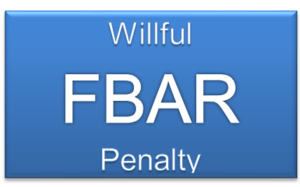
Wilfull FBAR Penalty.
The following is intended as an update to my January 26, 2019 Blog on the subject of the limitation of the willful FBAR (Foreign bank Account Report) penalty under United States v. Colliot, 2018 U.S. Dist. LEXIS 83159 (W.D. Tex. 2018) which capped the maximum willful FBAR penalty at $100,000. The predicate for the District Court’s decision is 31C.F.R. § 1010.820. In addition to Norman v United States (Ct. Fed. Cl. Dkt 15-872T, Order dated 7/31/18- (please see my January 26, 2019 Blog)), United States v. Horowitz, 2019 U.S. Dist. LEXIS 9484 (D. Md. 2019) and other recent decisions have dealt the Colliot decision a fatal blow. Consequently, individuals who are subject to the willful FBAR penalty should avoid using the Colliot decision as a basis for limiting their liability.
The District Court in Colliot held that the earlier regulation was still valid, notwithstanding the changes to the FBAR penalty structure under the American Jobs Creation Act of 2004 (AJCA), which increased the maximum FBAR penalty for willful violations to the greater of $100,000 or 50% of the Balance of the Account. § 5321(a) (5) (C)(i). The Court’s logic in reaching its conclusion was the absence of a new regulation adopting the higher penalty amount provided for under § 5321(a) (5)(C)(i).
The Horowitz and other recent decisions make clear that the Colliot decision is fatally flawed. While the Horowitz decision focused on the taxpayers’ “willful blindness” in sustaining the willful civil FBAR penalty, the Court also addressed the taxpayers’ reliance on the Colliot in asserting that the willful civil FBAR penalty was capped by 31 C.F.R. § 1010.820. The Horowitz decision came before the Court on a Motion for Summary Judgment filed by the Government seeking to sustain the FBAR penalties assessed against the Horwitz’s. The taxpayers filed a Cross Motion for Summary Judgement.
Is willful civil FBAR penalty limited?
The following discussion only addresses the issue of whether the willful civil FBAR penalty is limited under 31 C.F.R. § 1010.820(g) (2) in light of the 2004 Amendment which increased the maximum willful civil FBAR penalty to the greater of $100,000 or 50% of the account balance at the time of the violation.
United States v. Horowitz case analysis.
Peter Horowitz and his wife, Susan, lived in Saudi Arabia from 1984-2001 where Peter worked as an anesthesiologist. In 1988 the taxpayers opened a joint bank account at UBS. The account was funded with the money Peter earned as an anesthesiologist. The taxpayers returned to the United States in 2001 but did not close their UBS account, which as of 2008 had a balance of almost $2 million. Late in 2008, after learning of the legal problems UBS was experiencing, Peter travelled to Switzerland and closed the UBS account. After closing the UBS account, Peter transferred the account balance to an account that he opened at Finter Bank, another Swiss Bank, in which he designated the account as a “hold mail” account. The Finter bank account was opened solely in Peter’s name because Susan was not present at the time.
Peter was responsible for communicating with the taxpayers’ accountant who prepared their 2007 and 2008 federal income tax returns. Peter never disclosed the foreign financial accounts to the taxpayers’ accountant. In response to the questions that appear on Schedule B, Part III, concerning the existence of foreign financial accounts, the taxpayers always checked the “No” box. In addition, the Horwitz’s failed to file FBAR reports for 2007 and 2008. The taxpayers subsequently entered the Offshore Voluntary Disclosure Program sometime in January of 2010, but later elected to opt out.
The IRS assessed the willful FBAR penalty against each of the taxpayers for both the 2007 and 2008 tax years in the amount of $247,030. The Horwitz’s filed a timely protest letter and the matter was affirmed by IRS Appeals. The Government thereafter brought suit to reduce the assessment to a judgment.
In response to the Government’s Motion for Summary Judgment, the taxpayers filed a Cross Motion for Summary Judgment asserting their conduct did not rise to the level of willfulness. In their Cross Motion, the taxpayers, relying upon Colliot, also asserted that the willful FBAR penalty should be capped at $100,000. They cited 31 C.F.R. § 103.27, which is now 31 C.F.R. § 1010.820(g) (2) in support of their argument.
In granting the Government’s Motion for Summary Judgment, the District Court of Maryland for the Southern District laid to rest any hope of future reliance on Colliot. The Court, citing United States v. Larionoff, 431 U.S. 864, 873, 97 S.Ct. 2150, 53 L.Ed.2d 48 (1977 articulated a long standing principle that: “it is settled law that an agency’s regulations “must be consistent with the statute under which they are promulgated.” Furthermore, the Court, quoting from Norman v. United States 138 Fed.Cl. at 196 stated:
“Since the civil penalty amount for a “willful” violation in 31 U.S.C. § 5321(a)(5) (2003) was replaced with 31 U.S.C. § 5321(a)(5)(C)(i) (2004), the April 8, 1987 regulations are “no longer valid.”
The Norman decision is bolstered by Kimble v. United States No. 17-421, 2018 WL 6816546, at *15 (Fed. Cl. Dec. 27, 2018), a recent 2018 decision by the United Court of Claims, wherein the Court rejected the conclusion reached in Colliot that the IRS was bound by the maximum penalty provided for prior to the amendment in 2004. In Kimble, the Court, in sustaining the IRS assessment for willful violations of the FBAR statute, stated that the conclusion reached in Colliot:
“conflicts with the decision of the United State Court of Appeals in Barseback Kraft AB v. United States, 121 F.3d 1475 (Fed. Cir. 1997), where the Federal Circuit concluded that the fact that regulations ‘had not been formally withdrawn from the Code of Federal Regulations [did] not save them from invalidity’ based on a conflicting federal statute.” Id.
Finally, the Court in Horowitz’s case, in rejecting the taxpayers’ arguments, cited I.R.M. § 4.26.16.6.5(3) which provides:
“[f]or violations occurring after October 22 2004, the statutory ceiling is the greater of$100,000 or 50% of the balance in the account at the time of the violation.” I.R.M. § 4.26.16.6.5(3) (Nov. 6, 2015).
Considering the Horowitz, Kimble and Norman decisions as well as I.R.M. § 4.26.16.6.5(3), a successful challenge to the willful FBAR penalty based upon 31 C.F.R. § 1010.820(g) (2) is no longer viable. Congress also created a separate provision for a civil penalty for Non-Willful violations, making a clear distinction between willful and non-willful violations. H.R. Rep 108-755 at 615 (2004) (Conf. Rep.).
United States v. Colliot case analysis.
In Colliot, the IRS filed a lawsuit against Dominque G. Colliot to reduce the assessed penalties to a money judgment. The action filed in the United States District Court for Western Texas related to penalties that were assessed for willful failure to file FBAR’s for 2007-2010. The IRS assessed a $544,773 penalty for the tax year 2007 and $196,082 for the tax year 2008. Smaller penalties were also assessed for the tax years 2009 and 2010. In assessing the penalties, the IRS relied upon the authority contained in § 5321(a) (5) and 31 C.F.R. § 1010.820(g)(2). In response, Colliot filed a motion for summary judgment asserting that IRS incorrectly applied the law in calculating the civil willful FBAR penalties.
In its analysis, the Court discussed the 2004 amendment to § 5321 which increased the maximum civil penalties that could be assessed for the willful failure to file an FBAR, and in doing so, acknowledged the increase in the willful FBAR penalty to a minimum of $100,000 and a maximum of 50% of the balance in the unreported account at the time of the violations. The Court also noted the absence of any change to 31 C.F.R. § 1010.820(g) (2), which caps the maximum willful FBAR penalty at $100,000. In granting Colliot’s motion for summary judgement, the Court wholly ignored United States v. Larionoff, 431 U.S. 864, 873 (1977) and instead focused on the powers delegated by Congress to the Treasury Secretary under § 5321(a)(5) to determine the amount of penalty so long as it did not exceed the ceiling set by § 5321 (a)(5)(C).
In Larionoff, the Supreme Court, citing Bowles v.Seminole Rock Co, 325 U.S. 410,414 (1945) and quoting language from the Bowles decision stated:
“In construing administrative regulations, ‘the ultimate criterion is the administrative interpretation, which becomes of controlling weight, unless it is plainly erroneous or inconsistent with the regulation”. Id. at 873.
The Court, citing Manhattan General Equip Co. v Commissioner, 297 U.S. 129,134(1936) further stated:
“For regulations, in order to be valid, must be consistent with the statute under which they are promulgated.” Id at 873.
In Manhattan General Equip Co., the Supreme Court held that:
“A regulation which does not do this, but operates to create a rule out of harmony with a statute, is a mere nullity” Id at 134.
United States v. Norman case analysis.
In the Norman decision, the IRS assessed a penalty against Mindy P. Norman in the amount of $803,530 for the willful failure to file an FBAR in connection with a Swiss bank account she maintained during the tax year 2007. The taxpayer appealed the assessment with the IRS Office of Appeals, who affirmed the IRS assessment, concluding that Ms. Norman willfully failed to file an FBAR. The Taxpayer then paid the penalty in full and instituted an action In the United States Court of Federal Claims. Following a one day trial and in response to a letter sent by the Norman citing the Colliot decision, the Court of Claims, Ordered the IRS to respond and comment on Colliot. The IRS filed a timely response. However, the Court did not permit the Taxpayer to file a reply. After considering the IRS response and the trial testimony and other documents, the Court ruled in favor of the IRS and concluded that Ms. Norman willfully failed to file an FBAR in 2007 and that the assessed penalty in the amount of 50 percent of the balance of the unreported account was proper.
In arriving at its decision, the Norman Court painstakingly dissected the Colliot decision and properly pointed out the defects in the District Court’s logic in ruling in favor of the Ms. Colliot. The Court of Claims traced the legislative history of the BSA, the relevant statutory and regulatory provisions and the impact of the changes to the FBAR penalty structure as a result of the AJCA. The Court concluded that the District Court in Colliot ignored the mandate created by the amendment in 2004 and instead elected to focus on the language in §5321(a) (5) that vests the Secretary of the Treasury with the discretion to determine the amount of the penalty.
The Court of Claims cited the following language used by Congress in amending the statute as a basis for invalidating C.F.R. § 1010.820:
“Congress used the imperative ‘shall’ rather than the permissive, ‘may,’ thereby raising the ceiling for the penalty, and in doing so, removed the Treasury Secretary’s discretion to regulation any other maximum.” Norman at Pg. 8.
The Norman Court cited Larionoff for the proposition that Congress has the power to supersede regulations by amending a statute. The Court stated that “in order to be valid [,] [regulations] must be consistent with the statute under which they are promulgated.” The Norman Court concluded that § 5321 (a) (5) (C) (i) which sets the maximum penalty to the greater of $100,000 or 50% of the balance of the account, is inconsistent with 31C.F.R. § 1010.820 rendering 31 C.F.R. § 1010.820 invalid.
Conclusion.
The foregoing has particular relevance for those who have failed to take advantage of the Offshore Voluntary Disclosure Program, which is now closed, or otherwise failed to utilize the Streamlined procedures and those who have made quiet disclosure and now found themselves the subject of a grand jury subpoena. The IRS has consistently maintained that offshore financial crimes are a top priority and continues to work with its global partners in unmasking those with unreported foreign financial accounts. FATCA is also producing a steady stream of taxpayer information from which the IRS develops leads. In addition, current prosecutions of facilitators and taxpayers as well as taxpayers who have elected to come forward have yielded a treasure trove of information which the IRS is using to identify other non-compliant taxpayers.
Those who have failed to come forward and report their foreign financial accounts are more likely than not, going to be subject to the willful civil FBAR penalty consistent with Norman decision. Mitigation of the willful FBAR penalty is only possible where the taxpayer comes forward and makes an honest disclosure.
By: Anthony N. Verni, Attorney at Law, CPA
© 1/29/2019
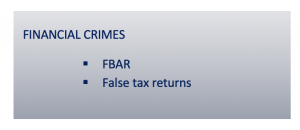 Individuals, who have failed to report their foreign financial accounts, may feel a sense of relief, in light of the corona virus and its effects on IRS investigations. Better think again!
Individuals, who have failed to report their foreign financial accounts, may feel a sense of relief, in light of the corona virus and its effects on IRS investigations. Better think again!
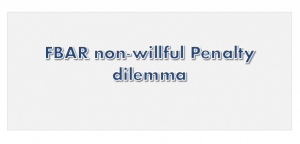 The Courts have recently addressed the issue of whether the FBAR Non-Willful penalty should be assessed per form rather than per account with conflicting results. In
The Courts have recently addressed the issue of whether the FBAR Non-Willful penalty should be assessed per form rather than per account with conflicting results. In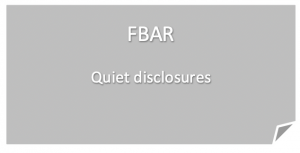 In April 2020, a Florida man pleaded guilty to tax evasion and the willful failure to file FBAR’s. What makes this case particularly interesting is that the taxpayer made use of a “quiet disclosure” rather than entering into the Offshore Voluntary Disclosure Program (OVDP). This is a classic case of greed on steroids.
In April 2020, a Florida man pleaded guilty to tax evasion and the willful failure to file FBAR’s. What makes this case particularly interesting is that the taxpayer made use of a “quiet disclosure” rather than entering into the Offshore Voluntary Disclosure Program (OVDP). This is a classic case of greed on steroids. Taxpayers who are considering coming out of the shadows to disclose their offshore accounts need to be extremely careful when deciding what road to take. Too often, taxpayers simply default to the cheapest method (streamlined procedures) when deciding how to proceed in making an offshore disclosure without considering the significant financial and criminal risks associated with choosing the wrong method.
Taxpayers who are considering coming out of the shadows to disclose their offshore accounts need to be extremely careful when deciding what road to take. Too often, taxpayers simply default to the cheapest method (streamlined procedures) when deciding how to proceed in making an offshore disclosure without considering the significant financial and criminal risks associated with choosing the wrong method.

 report his or her foreign financial accounts.
report his or her foreign financial accounts.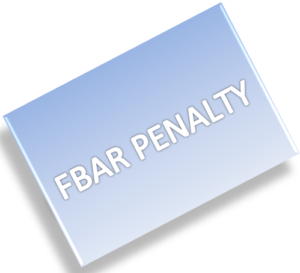
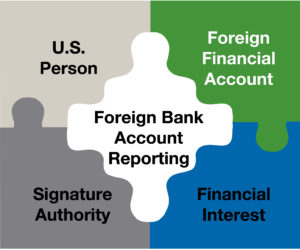 Case Facts.
Case Facts.
